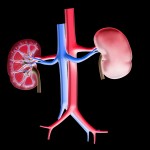 More than half of obese patients with diabetic nephropathy (kidney disease or damage that occurs in people with diabetes) had resolution of the condition following bariatric surgery, according to preliminary findings of a study presented at the 29th annual meeting of the American Society for Metabolic and Bariatric Surgery. The small retrospective study examined 52 Cleveland Clinic patients, who had an average age of 51 and body mass index (BMI) of 49. All of the patients received laparoscopic bariatric surgery, with about 70 percent having a gastric bypass procedure.
More than half of obese patients with diabetic nephropathy (kidney disease or damage that occurs in people with diabetes) had resolution of the condition following bariatric surgery, according to preliminary findings of a study presented at the 29th annual meeting of the American Society for Metabolic and Bariatric Surgery. The small retrospective study examined 52 Cleveland Clinic patients, who had an average age of 51 and body mass index (BMI) of 49. All of the patients received laparoscopic bariatric surgery, with about 70 percent having a gastric bypass procedure.
In the 5 years of follow-up, only 25 percent of the patients developed albuminuria (which means having too much protein in the urine) and 75 percent of the group experienced diabetes remission or improvement. Additionally, of the patients who had a normal level of protein in their urine prior to surgery, 75 percent remained normal 5 years post-surgery. In contrast, the American Diabetes Association estimates that 10—20 percent of diabetic patients develop nephropathy with each year of follow-up.
The researchers cited that in total, 20—40 percent of patients with diabetes develop nephropathy, in the form of either microalbuminuria (define as 30 to 299 mg/g) or macroalbuminuria (defined as ≥300 mg/g). Obesity in itself has a negative impact on the kidneys, aside from the effects of diabetes. Intra-abdominal pressure in an obese person can compress the kidneys which increases renal venous pressure and ultimately can contribute to kidney injury. While research has found weight loss to have mixed results in regard to the treatment of nephropathy, it is likely in part because some diets that promote weight loss are high in protein content, which can be harmful to an already fragile kidney. Weight loss surgery, however, has been found to be superior to medical therapy in treating obese diabetics, producing profound results in controlling hyperglycemia and insulin resistance. At the ASMBS meeting, the lead researcher, Dr. Helen Heneghan, explained that their findings suggest that weight loss surgery can induce significant improvement in diabetic nephropathy. She concluded that the “effect seems to be long-lasting, and is associated with good glycemic and hypertension control, even without the use of ACE inhibitors or angiotensin receptor blockers (ARB).”
We spoke with Dr. Gregg Jossart, expert bariatric surgeon and Director of Minimally Invasive Surgery at California Pacific Medical Center, about the study. He said: “This is yet another study proving the beneficial effects of weight loss surgery go beyond just treating diabetes, sleep apnea, hypertension and other core metabolic conditions. Even kidney function improves. Eventually, these types of studies may prove that kidney failure and the need for kidney transplantation can be reduced by surgical weight reduction.”
You can read more about weight loss surgery and diabetes improvement here.






Weight Loss Studies & Clinical